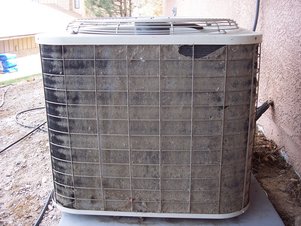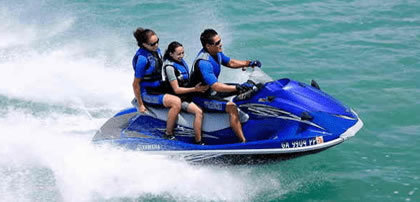
by Flagship Staff | Jul 31, 2017 | Blog
When the weather gets hot at this time of year, you tend to hear people say, “The dog days of summer are definitely here.” When I was young and I heard my parents say that, I knew it meant the hot weather was here and the air conditioning would be turned on. Thank goodness!
“The dog days of summer” isn’t a reference to our pets being outside in the heat with their tongues out, scrounging for a bowl of water. It refers to Sirius the Dog Star. It was thought in ancient times that when the Dog Star aligned with the sun, weather would get even hotter. This alignment occurs in July and goes into August.
When the weather gets hot and humid, the last thing you want to experience is trouble with your air conditioner.
My brother, as well as some friends of mine, recently experienced issues with their central air conditioning. For my friends, it led to buying a new and expensive system. Ouch! For my brother, it was a simple fix. His condenser unit was clogged with cottonwood.
A few years ago, I found my basement carpet soaked with water. I learned the plastic tubing that went from the furnace to the drain was clogged with mold and it caused the water to back up everywhere.
Here are some videos that may help you identify why your home isn’t cooling during the “dog days of summer.” If the repair looks too complicated, call your local heating and air conditioning contractor.
Air Conditioner Not Cooling
How to fix your AC! Outdoor fan not running
Hello, You Need a New Compressor on that Air Conditioner. NOT!
Furnace AC Water Leak Fixed
Do you have any information you’d like to share? I’d love to hear from you please share them in the box below.
Source:
http://news.nationalgeographic.com/2015/07/150710-dog-days-summer-sirius-star-astronomy-weather-language/

by Flagship Staff | Jul 24, 2017 | Blog
It’s hard to believe summer is here! The weather has finally gotten nice and my family is planning our annual trip to northern Wisconsin. I can’t wait to hop on that jet ski and take it for a spin around the lake.
Many places rent jet skis or boats for a day or a week. They typically offer many options, which is nice because not everyone likes the same thing. What’s also nice is that some policies provide automatic physical damage coverage if someone damages the jet ski. It may also include liability coverage for any injuries I might cause to someone else because of my driving.
I appreciate that this coverage is available and we don’t have to buy insurance from the rental facility. In fact, not only does my policy provide coverage under the homeowner’s portion, it also provides coverage under the umbrella portion.
You may have that coverage too, depending on your policy. Keep in mind, however, that you have only as much coverage as your policy’s limits. So if you have $100,000 of homeowner’s personal liability coverage, that’s the maximum that will apply to your rented boat or jet ski if you’re liable for injuries to other people.
The physical damage limit will be the same as your personal liability limit. So if you carry $100,000 of personal liability, that’s also your physical damage coverage limit or what’s available to cover damages to the rented boat or jet ski.
Now keep in mind this is a feature of certain polices, so you might want to check with your agent to see if you’re protected if you rent a boat or jet ski.
Here are safety tips and other resources to keep you safe if you’re boating or jet skiing this summer.
Safety Tips
– Understand U.S. Coast Guard requirements and state laws and regulations.
– Read your owner’s manual and understand the various on-board warnings located on your boat or jet ski.
– Wear a life jacket. While this sounds like common sense, the excitement of getting on a jet ski or riding in a boat may take your focus off safety. A life jacket is like a seatbelt. It should be worn at all times because it can increase your chances of survival if there’s an accident. http://www.uscgboating.org/safety/life_jacket_wear_wearing_your_life_jacket.aspx
– Stock your boat. Make sure you have an appropriate life jacket for each person onboard. An adult life jacket is not appropriate for children. In addition, if you plan to be on the lake for the day, make sure you have plenty of water, sunscreen, medications, and snacks. Lastly, make sure you have a fire extinguisher, flares, maps, and communication devices in case you run into trouble.
– Bring a back up. If you’re boating with friends or family, make sure somebody other than the driver is familiar with the boat. It’s not a safe idea for one adult to take a boat full of children out tubing. If the primary driver is injured or unable to navigate, it’s vital that a passenger is also familiar with the boat and can get you back to land safely.
– Keep an eye on the weather. Summer weather can change quickly. Pay attention to your local forecast and consider signing up for weather alerts that can be sent to your Smartphone.
– Be aware of your surroundings. Depending on the time of the year, boat traffic can be heavy on the lake. Make sure you always keep a close eye on what’s happening around you. If pulling a tube or skier behind your boat or jet ski, always have a spotter to alert you of issues.
Additional Resources
Sea Doo safety video
U.S. Aids to Navigation System
Boating Safety Resource Center
Al Roker Radio PSA
I can’t wait to get up north and enjoy summer activities, because before we know it, we’ll be shoveling snow again!

by Flagship Staff | Jul 17, 2017 | Blog
Are you going on a trip of a lifetime or a well-deserved family vacation this summer? If so, it can be both exciting and stressful. After months of preparation, there’s nothing left to do other than hop on a plane or jump in the car and go. But wait a minute! What about your family pet?
If you’re a new pet owner, figuring out what kind of care to provide while you’re gone can be stressful. For us, there were two options.
1. Leave them home alone in their natural environment and have people check in on them.
2. Take them to a pet lodge/resort (kennel).
Here are some tips to help you select the right place for your pet.
1. Get referrals. Ask your local veterinarian for recommendations. Also check online reviews, websites, and the Better Business Bureau for information.
2. Don’t wait until the last minute. For many of us, our pets are our pride and joy. You want to make sure they’re in a good place, so tour different facilities early. This will allow you to make a reservation at a place that’s right for you and your pet.
3. Evaluate the staff. When touring a facility, pay attention to the staff you see along the way.
– Are they knowledgeable?
– Are they dressed appropriately?
– Do they show compassion for the pets that are there?
– Are they using proper handling techniques?
– Do they have a good attitude?
4. Evaluate the facilities. The building and property should be maintained. If they can’t maintain their property, how can they take good care of your pet? In addition, evaluate the cleanliness of the facility. You shouldn’t see and smell dirt, fecal matter, and strong odors.
5. Discuss and understand their routine. Talk to the staff to get a clear understanding of what your pet’s day will look like. Some pets have a lot of energy and will need some playtime. Some facilities may charge extra for ala carte services.
6. Discuss communication. Check if it’s possible to receive regular communication on how your pet is doing.
7. Discuss medication policies and procedures. If your pet is taking a maintenance drug, it may be okay to board them. If they take numerous medications, it may not be feasible for the staff to provide the proper care your pet needs. You don’t want to discover this on the day you drop them off.
8. Go with your gut. Intuition is powerful. If you don’t feel good about the facility, move onto the next one. It’s important that you feel comfortable with your decision. As we do for our children, we want what’s best for our pets.
9. Comforts of home. Find out what you can bring from home and what the facility will provide to make your pet as comfortable as possible during their stay.
10. Enjoy your trip. If you’ve done your homework and picked a quality facility, your pet will be fine. Now it’s time to enjoy your trip.
For additional pet safety tips, visit the links below.
Pet-cation: Ways to help your pets cope during your absence
Ten safety tips to enjoy summer with your pet
Seven tips to make your pet’s holiday travel enjoyable and safe
Do you have any tips or information you’d like to share? I’d love to hear them; please share them in the box below.

by Flagship Staff | Jul 10, 2017 | Blog
Have you ever heard of the “summer slide”? No, it’s not spending time in the back yard watching your children go up and down the slide on their swing set. It’s also not a ride at the county fair. Summer slide describes what happens to children’s minds if they don’t exercise them during the summer months. What do I mean by exercise? Having kids read and do some cognitive thinking.
Many parents, me included, think about what activities our kids are going to be involved in during the summer months. We sign them up for swim lessons, volleyball camps, horse camps, boy/girl scout camps, or we spend time planning and going on family vacations. We have good intentions to make sure they focus on brain exercises (i.e., reading and math), but the warm weather and summer disappear fast.
The problem is that when school starts, they’re rusty. Things they learned the previous school year are gone, and teachers have to spend the first month of school re-teaching.
To learn more about summer slide and how to prevent it, I found an interview from Dan Hebel, chief professional officer at the Boys & Girls Club of Fond du Lac. Because of the great work the Boys & Girls Club does for children, I thought this would be a good resource.
Q: How do you or the club define the summer slide?
A: Summer slide is the loss of knowledge or concepts learned in the previous school year due to the lack of stimulating academic activities during the summer months. When students lack challenging educational opportunities that keep their brains thinking critically, there is a natural regression in the ability to learn new concepts because the previously-learned material must be re-learned.
Q: What does the Boys & Girls Club do to address this?
A: The Boys & Girls Club of Fond du Lac has a ten-week summer learning program offered to youth ages 7 to 11. Each child attends a mandatory daily, two-hour summer school learning program that focuses on teaching math and reading concepts and skills. The goal of the program is to keep their minds working and absorbing the material. Our program gives children a better opportunity to be prepared to learn on the first day of school, eliminating the need to catch up to their peers. This program serves an average of 130 youth per day, with over 250 participating during the summer.
Q: What are some ways parents and kids can help prevent the summer slide?
A: Education should be a part of the daily routine for children in the summer. Promoting reading time, short story writing or journal activities, and working on spelling words can be great ways to stimulate them to use language arts skills. Math flashcards and other logic and problem-solving exercises can be successful ways to stimulate their critical thinking and processing skills.
So if your kids haven’t done much reading or critical thinking this summer, it’s not too late. There are plenty of online resources to help you jump start a summer learning program. Here are some of them for your review.
–What Can Families Do to Keep Children Reading During the Summer?
–Children Who Can Read, But Don’t…
–Teenagers and Reading
And if your children spend a lot of time on their smart devices, Amazon has a subscription service called kindle unlimited. For $9.99 a month, you can enjoy unlimited access to more than 600,000 books. What’s really nice is that if your child doesn’t like to read books (like my youngest daughter), he or she can choose a book and read it on an electronic device which they might enjoy more.
Please make sure you download the appropriate book for them or you share with them your expectations. Not all books are suitable for children.
Do you have any comments you’d like to share? I’d love to hear them; please share them in the box below.
Topics: Family Safety, Health Tips

by Flagship Staff | Jul 3, 2017 | Blog
Pools and ponds can make for fun in the sun for you, your family, and friends, but they can also be a liability hazard and attract unwanted guests. It doesn’t matter if you have an in-ground or above-ground pool or a pond on your property; you have a liability exposure with all of them.
We’ll explain how you can protect others from harm and yourself from a liability claim if you have a pool or pond.
If you have an in-ground pool, it should be enclosed by a fence that’s at least five foot high and has a latching mechanism on all gates that access the pool area. If there’s no fence, it must be protected by an acceptable automatic safety pool cover (check with your insurance carrier to be sure the pool cover meets the safety features required to obtain coverage). This will keep unwanted guests from getting into the pool when you’re not able to monitor or use your pool.
If you have an above-ground pool, make sure the pool is installed to comply with your city’s ordinances. These pools must also have latching gates at any deck steps that lead to the pool. If there isn’t a deck attached to the pool, be sure the ladder is stored away from the pool when not in use.
If you have a pond on your property and your home is insured with West Bend, it’s not necessary to enclose the yard or pond area with a fence. Most properties that have ponds are in rural areas with few or no neighbors in close proximity. A fence may take away from the nature and beauty of a pond.
West Bend can ensure a pool exposure; however, it’s important to take precautions against unwanted guests using your pool in order to prevent a liability claim.
A diving board and/or pool slides are okay for in-ground pools and can make pool time more enjoyable. They can also harm your guests if they’re not installed properly.
Diving boards and pool slides should only be installed on in-ground pools. A diving board should be a diving platform rather than a springboard. The pool depth where the board is located should be at least nine feet. This will provide enough room above the bottom of the pool for a diver to avoid injury.
Pool slides installed on in-ground pools should be:
-professionally manufactured and installed;
-have handrails leading from the bottom to the top of the slide;
-have walkways and stairs leading to the top of the slide that are made of slip-resistant, rigid materials; and
-be no higher than 12 feet with a water depth at the slide’s drop off between 6-8 feet (depending on the height of the slide).
Diving boards and pool slides should not be installed on above-ground pools because water depths are typically not deep enough to prevent injury.
It’s also not safe to install diving boards or pool slides at your pond. The pond depth can vary from year to year and the bottom of the pond can change over time. A pond can develop debris and weeds. Rocks could surface on the bottom of the pond over time. The water may not be clear enough to see objects submerged in the water, making diving dangerous. For these reasons, neither diving boards nor slides should be installed on your pond.
Some insurance carriers will add more premium for these added exposures so always check with your insurance agent when installing a pool.
Whether you have a pool or a pond, keeping your family and guests safe — and unwanted guests out — will give you a more enjoyable experience for years to come.
Do you have any tips or information you’d like to share? I’d love to hear them; please share them in the box below.





